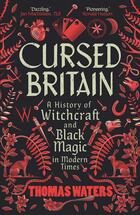
TITLE: Cursed Britain
AUTHOR: Thomas Waters
PUBLISHER: Yale University Press, 2019
ISBN: 978-0-300-25477-8
PODCAST EPISODE: Scheduled
REVIEWER: Tracey Norman
On many occasions, I have seen texts which purport that belief in malefic magic waned during the Victorian era as living conditions improved and advances in science and medicine pushed such things aside, labelling them ‘superstition’. Perhaps that occurred in some instances, yet if it was truly the case across the board, how is it that our folklore today is rich with examples of both beneficent and dark magic? How is it that even in the 21st century, we find people using charms, fearing ill-wishing, seeking out a cunning person for help? There are always two sides to a story and Thomas Waters’s superb book delves deeply into the other side of this one, revealing a rich and fascinating social history that tracks British witchcraft beliefs through their peaks and troughs to illustrate exactly what was going on during the 19th century and how that influenced the 20th and 21st.
Cursed Britain examines witchcraft from 1800 to date, each chapter focusing on a few decades to allow a detailed examination of society, beliefs, news reports and literature, among other relevant topics. The book is packed with case studies and detailed commentary, and has clearly been meticulously researched. The Endnotes are extensive and will, no doubt, provide an invaluable source for further reading on the various aspects of the subject discussed in the book. The chapters are subdivided into sections which are perfect for coffee break reading, whilst simultaneously providing rich and well-conceived analysis. There is no surface-skimming in this book.
The social history behind witchcraft beliefs is something which has long fascinated me and I thoroughly enjoyed this book. It teases out the various strands of Britain’s complicated relationship with witchcraft beliefs and presents them in an accessible, engaging, conversational style which makes it both easy and pleasurable to read. Whether you’re entirely new to the subject or a seasoned researcher, this is a book you should read.
AUTHOR: Thomas Waters
PUBLISHER: Yale University Press, 2019
ISBN: 978-0-300-25477-8
PODCAST EPISODE: Scheduled
REVIEWER: Tracey Norman
On many occasions, I have seen texts which purport that belief in malefic magic waned during the Victorian era as living conditions improved and advances in science and medicine pushed such things aside, labelling them ‘superstition’. Perhaps that occurred in some instances, yet if it was truly the case across the board, how is it that our folklore today is rich with examples of both beneficent and dark magic? How is it that even in the 21st century, we find people using charms, fearing ill-wishing, seeking out a cunning person for help? There are always two sides to a story and Thomas Waters’s superb book delves deeply into the other side of this one, revealing a rich and fascinating social history that tracks British witchcraft beliefs through their peaks and troughs to illustrate exactly what was going on during the 19th century and how that influenced the 20th and 21st.
Cursed Britain examines witchcraft from 1800 to date, each chapter focusing on a few decades to allow a detailed examination of society, beliefs, news reports and literature, among other relevant topics. The book is packed with case studies and detailed commentary, and has clearly been meticulously researched. The Endnotes are extensive and will, no doubt, provide an invaluable source for further reading on the various aspects of the subject discussed in the book. The chapters are subdivided into sections which are perfect for coffee break reading, whilst simultaneously providing rich and well-conceived analysis. There is no surface-skimming in this book.
The social history behind witchcraft beliefs is something which has long fascinated me and I thoroughly enjoyed this book. It teases out the various strands of Britain’s complicated relationship with witchcraft beliefs and presents them in an accessible, engaging, conversational style which makes it both easy and pleasurable to read. Whether you’re entirely new to the subject or a seasoned researcher, this is a book you should read.